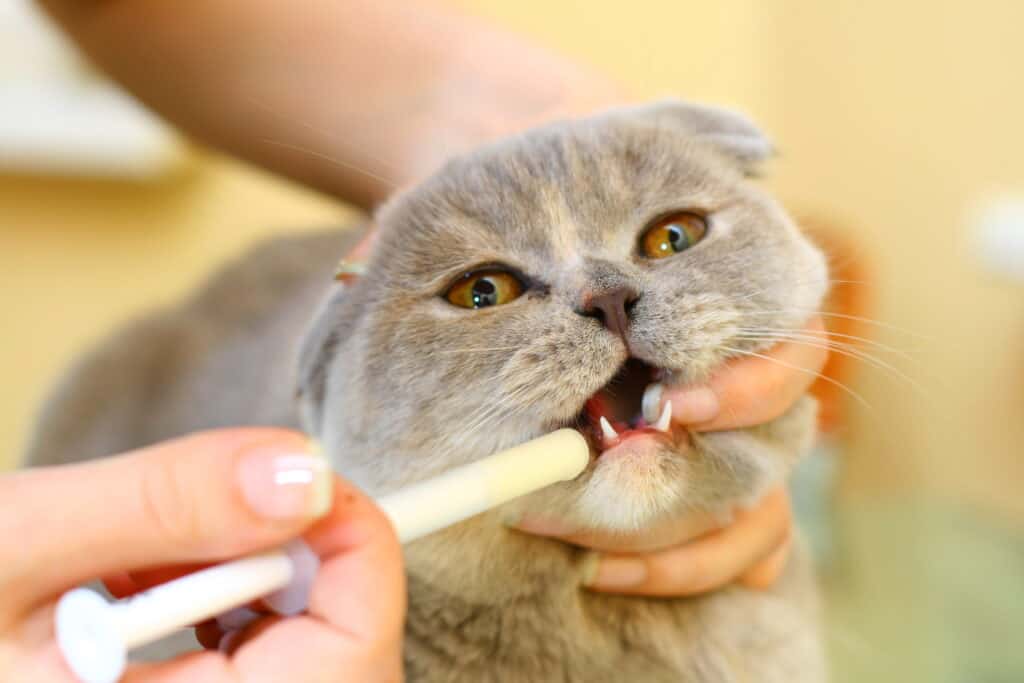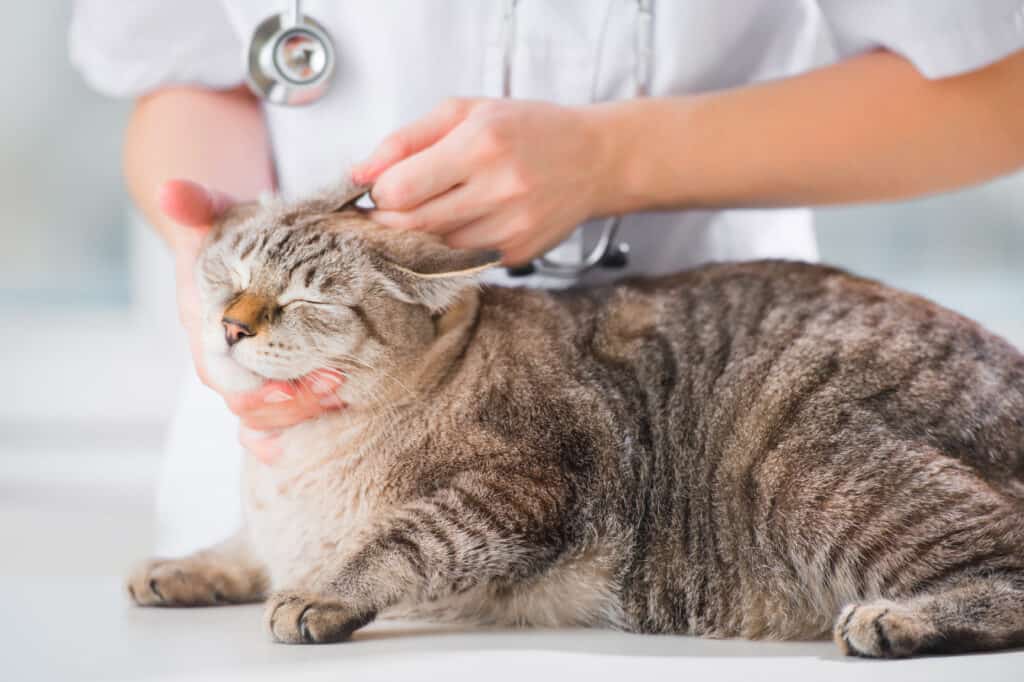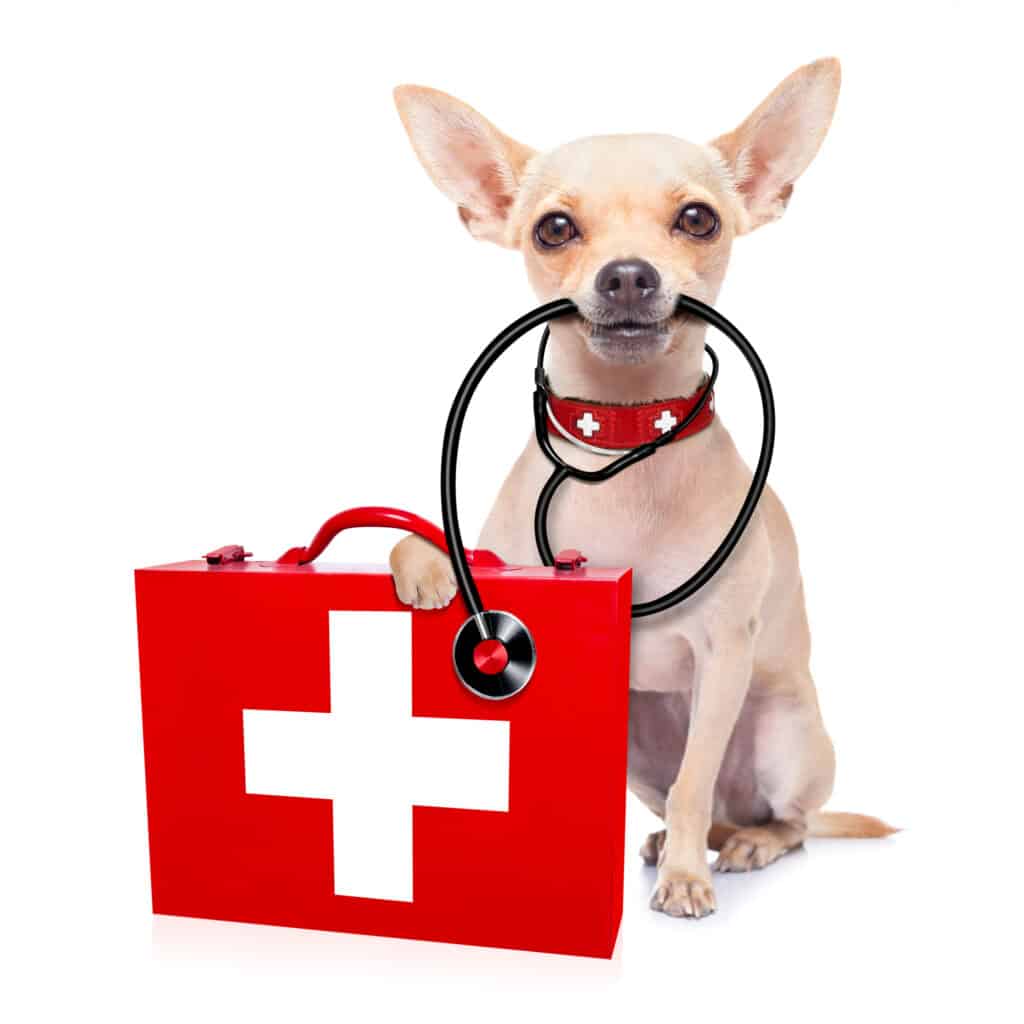Wondering how often should you bring your pet to the vet? You’ve come to the right place.
Even if you have a healthy, young pet, they still need to be seen by their doctor regularly so they can be evaluated for any health problems that may arise.
Regular check-ups are even more important for our pets because they can’t talk to us and tell us if anything is wrong. If something is going on that is very subtle, we may not pick up on it until it’s too far progressed.
Table of Contents (Quickly Jump To Information)
How Often Should You Bring Your Pet to the Vet? It Depends.

We’ll break this down into three different life stages- infant/young, middle aged/adult, and senior.
How Many Vet Visits Does a Puppy/Kitten Need?
If your pet is new to the world, they usually need to see their vet more frequently than when they get older. This is so they can be evaluated for any physical or behavioral abnormalities as they grow, and so they can get all of their age-appropriate vaccines (shots) to keep them healthy. For example, for puppies, this means visiting the vet every 4 weeks for 3-4 puppy wellness visits, starting at 6-8 weeks of age. Getting all of their shots at the correct time interval is extremely important for their health.
How Often Should Your Adult Pet Visit the Vet?
Our adult pets typically need to be examined by their veterinarian once a year. This is assuming they are doing well overall and you don’t have any health concerns for them. We’ll discuss in more detail why yearly visits are important, even if your pet seems to be completely healthy.
How Often Should a Senior Pet Visit the Vet?
Our older pets, those we consider seniors, should be examined by their veterinarians twice a year, or every 6 months. This is because the older they get, the quicker their health and comfort level could change at any moment. Typically, for a cat this is when they are 10 years of age and for a dog it is when they are 7-8 years of age.
Reasons to Visit the Vet

Even though you may not notice something being off with your pet, your veterinarian might pick up on something that could be addressed right away to prevent things from getting worse. Here are a few of the things your vet can objectively check with your pet year-to-year to determine if a subtle health change may be going on with them:
- Checking their weight on the same scale year to year
- Checking bloodwork & comparing how values change over the years
- Physical exams & how they change over the years
- Comparing their vitals (heart rate, respiratory rate, blood pressure) year to year
Weight Checks
It may be difficult for you to notice at home if your pet has gained or lost some weight over the year since you see them every day. In your vet’s office, they can weigh your pet and compare their body condition scores year over year to really notice if your pet has gained or lost weight. Both weight gain and weight loss can be indicators of an underlying health problem, which would clue your vet to recommend running bloodwork to evaluate their kidney, liver, and protein values, their blood sugar, and their thyroid level, among other parameters.
Bloodwork
Checking bloodwork either yearly or based off of physical exams and weight changes is something else your vet can do to pick up on subtle health changes going on with your pet. For instance, in early liver or kidney disease, your pet may not demonstrate any outward signs that something is going on.
Therefore, picking up on it by proactively checking bloodwork can help you stay ahead of the game. This way you can be able to start medications, supplements, or special foods that can help slow down the progression of such diseases. This usually prevents the diseases from taking you and your pet by surprise, which may lead to higher vet bills and unexpected costs due to emergency treatments, which may or may not improve your pet’s condition by that point.
Physical Exams
Having a physical exam done on your pet each year by their veterinarian is more important than you think. During this exam, their heart is listened to, their teeth are checked, they are examined for any signs of pain such as arthritis, and any lumps or bumps they have are measured to see if they’ve grown over the years.
If anything is different, such as the development of a heart murmur or the growth of a lump, during the exam of your pet, your vet can make you aware of these changes and create a plan with you to help manage the condition and slow down its progression.
Basic Vaccine Schedule and Preventative Care Measures
Your pet will also need to visit the veterinarian over time to engage in preventative care measures like vaccines. Annual and semi annual visits and routine wellness exams might include the following preventative health care measures:
- Administering and prescribing flea and tick prevention medications
- Taking a stool sample to monitor for parasites and worms
- Vaccine for distemper
- Kennel cough vaccine
- Booster shots (annual vaccination boosters are necessary for many shots, like rabies boosters)
- Dental exam and dental care
- Feline leukemia vaccines
Should I Take My Dog to the Vet? Emergency Symptoms to Pay Attention To

There are some situations that warrant an emergency veterinarian visit. Although these visits can be costly, they can save your pet’s life. If you notice any of the following health issues, get your pet to the vet ASAP.
- Sudden weight loss or rapid increase in body weight
- Extreme pain
- Strange behaviors
- Difficulty breathing
- Lethargy
- Anxiety
- Coughing or restlessness at night
- Coughing up blood or frothy liquid
- Pale or yellow gums
- Elevated heart rate or high blood pressure
- Inability to move
- Ingestion of poison or toxin
- Serious bleeding or injury (including serious bite wounds)
- Tremors or seizures
Is Pet Insurance Worth the Cost?

With all those vet visits on your agenda, it might seem like your costs are going to skyrocket out of control. Just a single well visit to the vet can cost well over $100 – and that’s not including the costs of medications, vaccinations, and specialized services.
If you really want to stay on top of things, you may want to consider investing in pet insurance. This insurance is often as low as $20 a month, so it can be worth the money.
In summary, it’s very important to have your pet seen by their vet regularly, even if they are seemingly healthy. In between these yearly health checks, if you feel your pet is sick or isn’t acting right, it’s also important to schedule an appointment with your veterinarian and have them checked out.
Vet costs can be high and there is an investment of time when it comes to making and keeping vet appointments, but a yearly checkup, at the very least, is vital for keeping your pet healthy.
Related Articles:
- How to Keep a Pet From Wriggling When Giving it Medicine
- How to Stop a Dog From Attacking Other Pets
- Pets Scared of the Vet
- Why Does My Dog Eat Poop?
Leslie Brooks graduated from the University of Tennessee College of Veterinary Medicine in 2012. After graduation she did a one-year intensive rotating clinical internship, with rotations in various specialties. She has been working in small animal clinical medicine ever since and ran her own house call practice for three years. She currently lives in Indiana with her husband, son, and cat named Callie. She spends much of her free time volunteering in the community, from Meals on Wheels to working with pets of the homeless and vulnerable. She also loves to travel and read.






